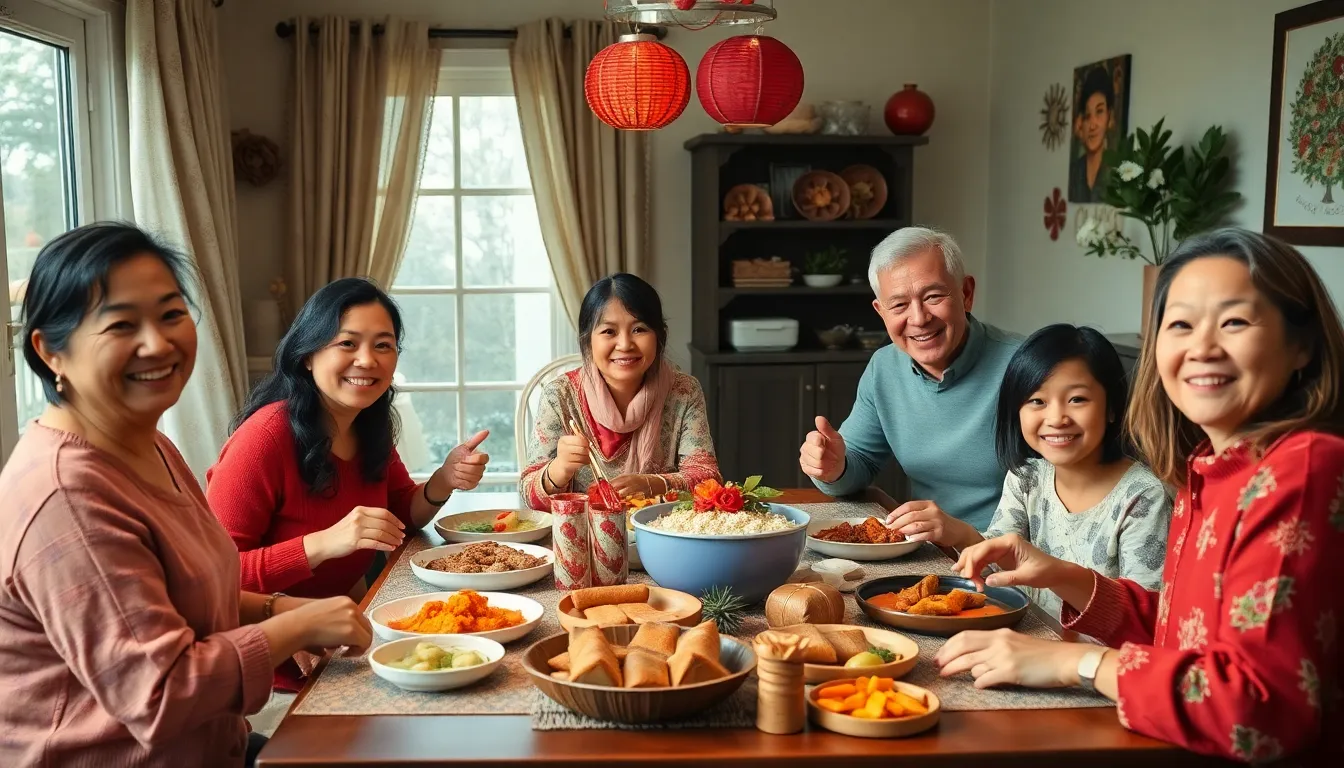In a world where family traditions can sometimes feel as stale as last week’s fruitcake, multicultural family traditions bring a refreshing twist to the table. Picture this: a Thanksgiving feast where the turkey shares the spotlight with tamales and sushi. It’s a delightful mash-up that not only tantalizes taste buds but also weaves together stories from across the globe.
Embracing these diverse customs can turn any family gathering into a vibrant celebration of love, laughter, and a dash of culinary chaos. Whether it’s Diwali lights mingling with Christmas carols or Lunar New Year dragon dances colliding with Fourth of July fireworks, multicultural traditions invite everyone to join the party. So grab your fork and your sense of adventure; it’s time to explore how these unique practices enrich family life and create unforgettable memories.
Table of Contents
ToggleUnderstanding Multicultural Family Traditions
Multicultural family traditions bring unique experiences and insights into gatherings. Blending various customs enriches relationships and fosters understanding among family members.
Definition and Significance
Multicultural family traditions refer to practices and rituals stemming from different cultural backgrounds. These traditions encompass celebrations, culinary experiences, and shared narratives that honor heritage. Recognizing these traditions strengthens family bonds and cultivates respect for diverse cultures. By embracing different customs, families create inclusive environments where all heritage is appreciated. Enhanced cultural awareness promotes tolerance and enriches interpersonal relationships.
Importance in Modern Society
Multicultural family traditions play a crucial role in today’s society. They bridge cultural gaps and foster social cohesion among diverse populations. Encouraging participation in different customs helps individuals develop a broader worldview. Celebrating various cultural events promotes unity and fosters respect among communities. Moreover, sharing these unique traditions instills a sense of identity in younger generations. As families navigate an increasingly interconnected world, embracing multiculturalism ensures a richer, more harmonious society.
Key Elements of Multicultural Family Traditions

Key elements of multicultural family traditions contribute significantly to enrichment and connection among family members. These elements influence celebrations, culinary practices, and communication styles.
Celebrations and Festivals
Celebrations represent vibrant moments in multicultural families. Distinct festivals like Diwali, Hanukkah, and Lunar New Year bring diverse customs together. Each event enriches family gatherings, showcasing unique rituals and practices. Families often blend these celebrations, creating hybrid events that honor various backgrounds. Embracing diversity during holidays fosters unity, encourages shared experiences, and deepens connections.
Culinary Practices
Culinary practices play a central role in bringing families together. Different cultural dishes can transform traditional meals into exciting culinary adventures. Tamales, sushi, and pasta reflect broader heritage while satisfying diverse palates. Each meal becomes an opportunity to share stories and impart family history. Exploring new recipes alongside cultural cooking methods cultivates lasting family bonds and strengthens connections.
Language and Communication Styles
Language and communication styles shape interactions within multicultural families. Each culture contributes unique phrases, idioms, and conversational approaches. Families often incorporate multiple languages, enriching communication and fostering understanding. Emphasizing respect for different dialects enhances relationships and promotes learning among family members. Encouraging open dialogues about language strengthens connections and instills appreciation for diverse backgrounds.
Examples of Multicultural Family Traditions
Multicultural family traditions showcase a beautiful integration of diverse practices, enriching family life through variety and creativity.
Unique Traditions from Various Cultures
Unique customs emerge from different cultural backgrounds. In Mexican families, the Día de los Muertos honors deceased loved ones, celebrated with altars, colorful decorations, and special foods. Japanese families often celebrate Shichi-Go-San, a rite of passage for children at ages three, five, and seven, with traditional clothing and photos. Indian families celebrate Holi, the festival of colors, by throwing colored powders at each other in joyous gatherings. Each culture brings distinct rituals and flavors, fostering collective memory and engagement through shared experiences.
How Different Cultures Influence Each Other
Cultures influence each other in many ways, leading to unique traditions. Families might blend food, such as adopting Italian pizza with Mexican toppings for family dinners. They often adopt elements from one another’s holidays, integrating Diwali’s lights into Christmas decor and learning dances from each other’s celebrations. The sharing of stories and ideas contributes to a rich cultural tapestry, encouraging openness and understanding. Through these exchanges, multicultural families develop a deep appreciation for their diverse heritages, strengthening family bonds in the process.
Benefits of Embracing Multicultural Family Traditions
Embracing multicultural family traditions offers numerous benefits that impact family dynamics and individual growth.
Strengthening Family Bonds
Sharing diverse traditions enhances family connections. Families partake in unique rituals such as preparing traditional meals or celebrating holidays together. These activities foster a sense of belonging that strengthens relationships. Engaging in joint celebrations creates shared memories, uniting family members in meaningful ways. For example, cooking a culturally significant dish encourages teamwork and collaboration among generations. The rich tapestry of experiences nurtures affection and solidarity within the family unit. Families evolve into more cohesive units, enriching their interactions through the appreciation of each other’s backgrounds.
Promoting Tolerance and Understanding
Celebrating various cultural traditions promotes acceptance and respect for differences. Exposure to diverse customs broadens perspectives and fosters empathy among family members. Observing the nuances in cultural practices cultivates open-mindedness, nurturing an environment of tolerance. Families that utilize multiple languages in their interactions enhance communication skills and deepen understanding. Dialogue about varied celebrations, like Diwali or Hanukkah, teaches the importance of respecting traditions outside one’s own. This commitment to understanding shapes children into well-rounded individuals who appreciate diversity, laying the foundation for a harmonious community.
Embracing multicultural family traditions enriches lives in countless ways. These unique practices not only enhance personal connections but also foster a deeper understanding of diverse cultures. Families that celebrate a blend of traditions create a vibrant tapestry of experiences that resonate across generations.
By integrating various customs into their gatherings, they cultivate an environment where respect and appreciation thrive. This commitment to diversity not only strengthens family bonds but also nurtures a sense of belonging and identity. As families navigate an interconnected world, embracing multiculturalism becomes essential for building a more inclusive and harmonious society.

